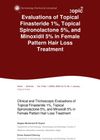 6 citations,
February 2023 in “Biomaterials Research”
6 citations,
February 2023 in “Biomaterials Research” Special gels help heal diabetic foot sores and reduce the risk of amputation or death.
 5 citations,
May 2022 in “Molecules”
5 citations,
May 2022 in “Molecules” Botulinum toxin is effective for various skin conditions, but more research and awareness of side effects are needed.
 4 citations,
August 2023 in “Materials”
4 citations,
August 2023 in “Materials” New synthetic polymers help improve skin wound healing and can be enhanced by adding natural materials and medicines.
 4 citations,
March 2023 in “Current Oncology”
4 citations,
March 2023 in “Current Oncology” Scalp cooling is the only FDA-approved method to prevent hair loss from chemotherapy, but other treatments like minoxidil and PRP are being tested.
 4 citations,
December 2021 in “Experimental and Therapeutic Medicine”
4 citations,
December 2021 in “Experimental and Therapeutic Medicine” Adult female acne is complex and requires a combination of treatments for effective management.
 4 citations,
November 2021 in “Pharmaceuticals”
4 citations,
November 2021 in “Pharmaceuticals” Paeonia lactiflora and Poria cocos extracts can potentially increase hair growth and reduce hair loss symptoms by lowering testosterone and inflammation levels.
3 citations,
August 2022 in “International Journal of Molecular Sciences” COVID-19 can cause hair loss, and treatments like PRP and stem cells might help.
3 citations,
November 2021 in “Clinical, Cosmetic and Investigational Dermatology” Autologous cellular micrografts improve hair density and thickness in the short term for androgenetic alopecia.
3 citations,
May 2020 in “Journal of The Korean Medical Association” Minoxidil and finasteride are effective for treating hair loss, with dutasteride showing potential but with side effects.
3 citations,
September 2016 in “Clinical, cosmetic and investigational dermatology” Sphinganine can reduce hair loss and improve scalp health.
 3 citations,
April 2022 in “Clinical, Cosmetic and Investigational Dermatology”
3 citations,
April 2022 in “Clinical, Cosmetic and Investigational Dermatology” Different methods, including stress management, healthy diet, supplements, and treatments like minoxidil, can help hair grow back after COVID-19 related hair loss.
2 citations,
February 2024 in “Pharmaceutics” Chitosan scaffolds with silver nanoparticles effectively treat infected wounds and promote faster healing.
2 citations,
January 2021 in “Indian Journal of Dermatology, Venereology and Leprology” Betamethasone is more effective for hair regrowth than latanoprost but has more side effects.
 1 citations,
December 2023 in “Environmental pollution”
1 citations,
December 2023 in “Environmental pollution” Hair analysis shows infants and mothers in north-western Spain are exposed to environmental pollutants, with factors like diet and residence affecting pollutant levels.
 1 citations,
August 2023 in “Military Medical Research”
1 citations,
August 2023 in “Military Medical Research” Smart hydrogel dressings could improve diabetic wound healing by adjusting to wound conditions and controlling drug release.
 1 citations,
July 2023 in “Cureus”
1 citations,
July 2023 in “Cureus” Some treatments for hereditary hair loss are effective but vary in results and side effects; new therapies show promise but need more research.
 1 citations,
March 2023 in “Frontiers in Medicine”
1 citations,
March 2023 in “Frontiers in Medicine” Topical prostaglandin analogs may help with hair growth but more research is needed.
 1 citations,
July 2022 in “PLOS ONE”
1 citations,
July 2022 in “PLOS ONE” The study concluded that people with Lichen Planopilaris have a more diverse scalp bacteria and different metabolic pathways compared to healthy individuals.
 1 citations,
September 2021 in “Skin appendage disorders”
1 citations,
September 2021 in “Skin appendage disorders” Botulinum toxin injections can help treat common hair loss in men, but more research is needed to confirm this and understand how it works.
 1 citations,
February 2017 in “MOJ bioequivalence & bioavailability”
1 citations,
February 2017 in “MOJ bioequivalence & bioavailability” Treating hair loss effectively may require a multi-sided approach, using different treatments together, and topical treatments could be more effective and safer than oral ones.
 1 citations,
July 2023 in “Journal of Clinical Medicine”
1 citations,
July 2023 in “Journal of Clinical Medicine” Different causes of beard hair loss have various treatments, including medications, lifestyle changes, and procedures to stimulate hair growth.
1 citations,
July 2022 in “Clinical, Cosmetic and Investigational Dermatology” Taohong Siwu Decoction may help treat hair loss by targeting multiple genes and pathways.
February 2025 in “Indian Dermatology Online Journal” Calcipotriol is the safest and most effective for hair regrowth in localized alopecia areata.
Alopecia Areata causes hair loss and needs treatments that address both physical and emotional health.
 January 2025 in “Dermatology Practical & Conceptual”
January 2025 in “Dermatology Practical & Conceptual” Topical finasteride is as effective and safe as minoxidil for treating female pattern hair loss.
January 2025 in “Pharmaceuticals” Nanocarriers can improve antioxidant delivery to the skin but face safety and production challenges.
January 2025 in “Molecules” Caffeine may help with hair loss, but more research is needed to confirm its effectiveness.
 December 2024 in “Journal of Clinical Medicine”
December 2024 in “Journal of Clinical Medicine” Minoxidil shows promise for alopecia areata, but more research is needed before it can be recommended as a primary treatment.
 November 2024 in “Clinical Cosmetic and Investigational Dermatology”
November 2024 in “Clinical Cosmetic and Investigational Dermatology” Rosemary oil may effectively treat hair loss with fewer side effects, but more research is needed.
 September 2024 in “Current Oncology”
September 2024 in “Current Oncology” Docetaxel often causes hair loss, with limited effective treatments and no cure for permanent hair loss.



















